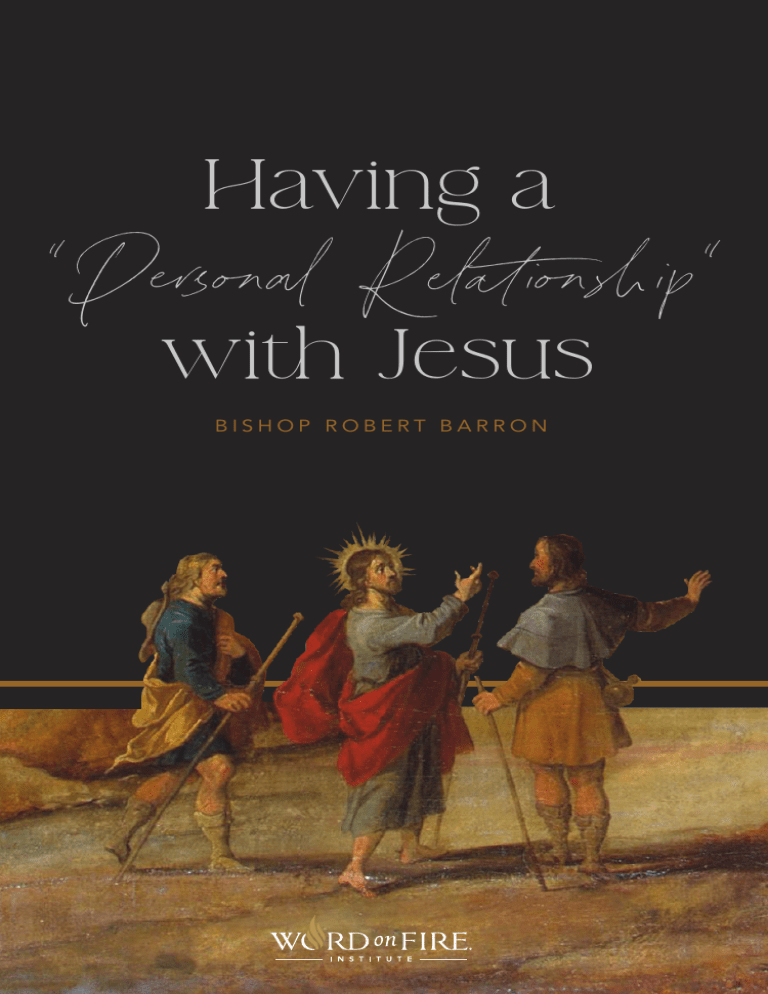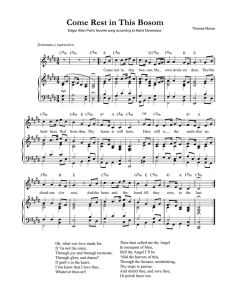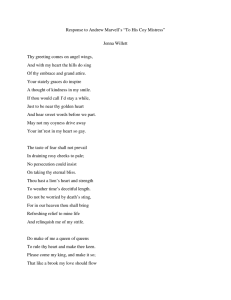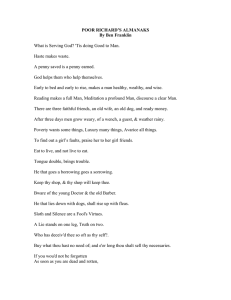
Having a “Personal Relationship” with Jesus BISHOP ROBERT BARRON Having a “Personal Relationship” with Jesus BISHOP ROBERT BARRON Transcript taken from a talk given by Bishop Robert Barron. © 2022, All rights reserved. The USCCB General Meeting that I attended in November 2016 ended with a morning of prayer, which included Eucharistic benediction, Liturgy of the Hours, and so on. At the heart of it was a sermon given by now-former Archbishop Peter Sartain, of Seattle, who’s been a great leader of the church and a friend for some years. What really struck me in his wonderful sermon was his reference to the great Catherine of Siena. One of the most striking features of this remarkable woman’s life was her real intimacy with so many of the heavenly figures. She had this intense, personal dialogue with the Blessed Mother, with the saints, and with the Lord himself. The Archbishop relayed a story that her spiritual director, Raymond of Capua, would tell. Often when she was reciting the Office, walking up and down a cloister, she would recite it in communion with Jesus, who was mystically visible to her, and they would exchange the Psalms the way one does in a choir. When she came to the end of the Psalm, she would recite the Glory Be, as is the liturgical custom. But she would change the words a bit and say, “Glory be to the Father, and to Thee, and to the Holy Spirit,” because she was speaking directly to Jesus. Prayer was 1 not something abstract for her. She was not trying to commune with some distant power. It was a very intimate, personal conversation. And Archbishop Sartain invited us to reflect a bit on her use of the word “thee.” Now, in Latin, she would have said, “Gloria patri et tibi,” meaning “Glory be to the Father and to you,” but she would use the more intimate form of “you.” In a lot of languages, Latin included, the second personal pronoun has both a formal and an informal mode. You can say “you” formally to someone you have just met, or with whom you have a distant relationship. Or you can say “you” in a more intimate way, like du versus sie and German, or tu versus vous in French, et cetera. What the Archbishop asked us to see was that “thee,” in older English, is that intimate form of the second person. In the odd way that spoken English has developed, we tend to think of “thee” and “thou” and “thine” and “thy” as being very formal and kind of regal. But in fact, it was just the opposite. ”You” and “yours” were more formal, but “thee” and “thy” were more intimate. That was the way one would speak to a child, or to a friend, or to someone that one was close to. And then the Archbishop said, “Remember, in our prayers, we conserve this.” Our Father who art in heaven, hallowed be thy name. Thy kingdom come, thy will be done. And the Hail Mary as well: Hail Mary, full of grace, the Lord is with thee. Blessed art thou among women. 2 How wonderful that in our most exalted prayers, we invoke God and the Blessed Mother in this deeply personal way. This is not just a curiosity; in fact, it reveals something momentous about Christianity. Contrast it, for example, with philosophies and mysticisms of the ancient world. Platonism, Plotinianism, Gnosticism all come to mind. All those systems would speak of the divine, of some great ontological source, some high mystical principle of all things. But they would never dream of addressing that power with the intimate form. One would never say thou to that source or power. And of course the ancient philosophies have an echo in more-contemporary thought. Go back to the deism that was so popular in the eighteenth century and influenced the Founding Fathers of our country. They talk about a first principle of the universe. Think of the pantheist mysticisms of Friedrich Schleiermacher and Ralph Waldo Emerson in the nineteenth century. They, of course, have an echo in the New Age spiritualities of our own time. Again, all those talk about the divine or the sacred, some mystical source, but one would be hard pressed in a Schleiermacherian or Emersonian or New Age perspective to address this power as thou. Then there is the Bible. Don’t tell me, for example, that the Bible is just one more iteration of the monomyth or that the Bible is one more version of the universal religious story. It is not. The Bible knows 3 all about God’s transcendence. It knows all about this sort of awful, uncontrollable, inscrutable power of the creator of the universe. So the Bible has no ignorance of those great mystical heights. But at the same time, the Bible says that God is a person, who has created us individually, who loves us personally, who guides us, and who draws us, ultimately, into his own life. You will not find that in Plato. You will not find that in Plotinus. You will not find that in Emerson, or Schleiermacher, or the New Age. Keep pressing it. The Bible then speaks of this personal God, who lives among us. That is St. John’s beautiful language, that the Word became flesh and “dwelt among us,” as we often translate it (John 1:14). But the Hebrew and the Greek have the sense of “pitching his tent among us.” God becomes one of us, in such a remarkable fashion that, in Jesus, he says, “I no longer call you slaves, but friends” (John 15:15). Now let that sink in, the peculiarity of biblical Christianity: that God, the high God, the Creator of heaven and earth, the inscrutable, uncontrollable, ineffable, transcendent mystery of God, calls us friends, so that we can respond to him as thou. There is a world of difference. And, in fact, Christianity turns those other mysticisms on their head. This matters so much, I think, for our contemporary concern for evangelization. 4 What is evangelization? It is not just sharing ideas about Christianity, as important as that is. I’m an idea guy. I have spent my whole life teaching and writing. But evangelization is the introduction of someone into a friendship with Jesus Christ, into a relationship with him. And as the old adage has it, Nemo dat quod non habet: “Nobody gives what he does not have.” One of the reasons that we do not evangelize effectively is that a lot of even professed Christians do not walk personally with Jesus. And I’m not going to say, “Oh, that’s just a ‘born again’ Christianity thing.” That is Christianity in a nutshell: to walk personally with Christ. Once you do that, once you address him with the word thou, once you know that you have a friendship with the Lord, then you are able to share it. And that is what real evangelization is all about. Subscribe to Bishop Barron’s YouTube Channel at https://www.wordonfire.org/youtube. You’ll love his weekly Sunday Sermon, the Word on Fire Show, and insightful discussions and commentaries! 5






